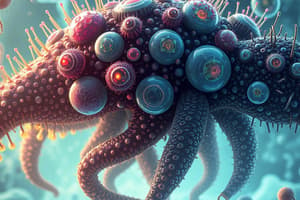Podcast
Questions and Answers
Which group of organisms are usually too small to be seen with the naked eye?
Which group of organisms are usually too small to be seen with the naked eye?
- Protists
- Fungi
- Bacteria
- Microorganisms (correct)
Which taxonomic classification system is followed for microorganisms?
Which taxonomic classification system is followed for microorganisms?
- Watson-Crick system
- Linnaean system (correct)
- Mendelian system
- Darwinian system
Which group of microorganisms have cells that are of the eukaryotic type?
Which group of microorganisms have cells that are of the eukaryotic type?
- Viruses
- Protists
- Bacteria
- Fungi (correct)
Which group of microorganisms have cells that are of the prokaryotic type?
Which group of microorganisms have cells that are of the prokaryotic type?
Which group of microorganisms are acellular, also known as non-living entities?
Which group of microorganisms are acellular, also known as non-living entities?
Flashcards are hidden until you start studying
Study Notes
Microorganisms Overview
- Microorganisms typically include bacteria, viruses, fungi, and protozoa, often too small for human visibility without a microscope.
- These organisms are essential in various ecological and biological processes.
Taxonomic Classification
- A hierarchical taxonomic classification system is followed, which includes domains (such as Archaea, Bacteria, and Eukarya) and further subdivides into kingdoms, phyla, classes, orders, families, genera, and species.
Eukaryotic Microorganisms
- Eukaryotic microorganisms possess complex cells with a nucleus, including organisms such as fungi, protozoa, and some algae.
- They often have membrane-bound organelles, providing compartmentalization for cellular functions.
Prokaryotic Microorganisms
- Prokaryotic microorganisms consist of simpler cells without a nucleus, primarily including bacteria and archaea.
- These cells are generally smaller in size and lack the membrane-bound organelles found in eukaryotes.
Acellular Microorganisms
- Acellular microorganisms, or non-living entities, include viruses and prions.
- They cannot reproduce independently and require a host cell for replication, highlighting their unique status in biological classification.
Studying That Suits You
Use AI to generate personalized quizzes and flashcards to suit your learning preferences.




